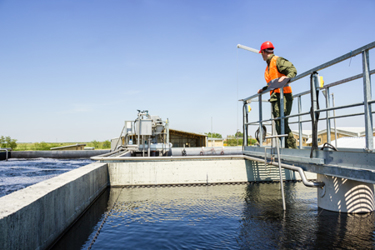WWEMA Window: Stability In Unstable Times
By Adam Neumayer

The world has seemingly been under siege for several years. From the pandemic to record droughts, the bad news keeps flowing. The water and wastewater industry has not been immune to any of this. Whether it be the pandemic, accelerating inflation, supply chain challenges, staffing shortages, or legislative responses — uncertainty is becoming the norm. Stability has long been a hallmark of the water and wastewater industry. Today, the notion of a stable and predictable market feels like the distant past. Without stability, costs and price become significantly more difficult to accurately forecast. This uncertainty makes it exceedingly difficult to deliver projects on time and on budget for everyone in the industry. Albeit only a short time ago, the “old days” seem very appealing in our current environment. With the anticipated guidance on Build America, Buy America (BABA) domestic content requirements expected soon, we find ourselves at the precipice of yet another potential disruption. Engagement is needed now more than ever to ensure that we can meet the needs of a rapidly changing market. Examples of the power of engagement leading to vastly different resolutions can be found in some of our most significant issues of the day.
At the close of yet another summer of widespread and sustained drought, the situation is reaching unprecedented levels. Lake Mead and Lake Powell have reached record low levels, prompting water rationing and an ever-increasing sense of urgency to find a solution. Interesting and seemingly viable ideas such as piping flood waters to the Southwest or water reuse are well documented. Unfortunately, these types of ideas get mired in opposing geopolitical points of view and progress stalls. Many studies have been conducted to address drought. They are often characterized by massive investment in infrastructure at a national level to address an issue that some view as just a regional problem. Given the current scale of investment in infrastructure, one of these solutions is sure to be viable. Yet year in and year out, the problem grows without sincere engagement or measurable progress.
Conversely, when most parties are working in a common direction with similar purpose, great progress can be made. An example of this can found in wastewater analytics. The pandemic created the need for early detection of COVID outbreaks in communities. Engagement with experts, deployment of resources, and cooperation among many interested parties produced major advancements in surprisingly short timelines. The achievements have been truly outstanding, resulting in our industry being capable of tracing COVID outbreaks over a large population through wastewater surveillance. These techniques have been expanded to other emerging viruses such as monkeypox and polio. As we move from individual testing, solutions like this can be used to shift resources ahead of the need.
With all this seemingly relentless adversity, we as an industry must resist getting beleaguered. We are a resilient profession, serving the public at every level. Together our industry will find a way through this period of persistent unknowns. However, these unknowns add unpredictable costs to projects. Whether it be supply chain challenges, geopolitical conflict, inflation, or staffing shortages, the uncertainties affecting the current market are vast. Many of the issues tend to be intertwined and build momentum from one another as we have seen from material shortages, supply chain difficulties, and significant inflation. As an industry, we must engage to control what we can control. Perhaps the most impactful influencer of the market in the coming months will be the interpretation and guidelines of the domestic content requirements of BABA. This has the potential to drastically increase the cost and extend delivery times of projects and make existing supply chains vulnerable.
The water and wastewater industry are different in many ways from other sectors affected by BABA. Most significant among those are:
- A reliance on stainless steel due to wastewater environmental factors
- A requirement for ever-increasing sophisticated controls to more efficiently operate treatment facilities
- Integration of many technologies and components to provide a seamless process with minimal risk to the public
Learning from our history, predictable markets are often stable markets. Many in the water and wastewater industry are faced with potentially reshaping significant portions of their supply chains. This will take time and an immense effort. Uncertainty from the upcoming interpretation of BABA and the impacts it can have serve to increase the perception of risk from all interested parties. The surest means to add costs to an investment is the need to account for risks from unknowns. The Build America, Buy America Act is the clearest market driver that can be positively influenced through engagement. It is evident that the public interest will be best served through predictability and practical solutions where it is possible.
Now is the time to get involved, have your voice heard, get engaged. WWEMA is actively involved in identifying these costs and challenges and works vigorously to minimize the impacts for wastewater treatment plants (WWTPs), WWEMA members, and the overall water technology market more broadly. Working with politicians, state agencies, and other stakeholders, WWEMA is our industry’s voice and is well-positioned to help you engage and ensure your business interests are heard and receive a response. This engagement through education, information-sharing, constructive dialog, and advocacy is necessary to ensure that our industry remains strong in a constantly changing environment and that some measure of stability is added to these unstable and unpredictable times.
Adam Neumayer is the Managing Director of Hydro International – Water and Wastewater Solutions, as well as a member of the Water and Wastewater Equipment Manufacturers Association (WWEMA) Board of Directors. WWEMA is a non-profit trade association that has been working for water and wastewater technology and service providers since 1908. WWEMA’s members supply the most sophisticated leading-edge technologies and services, offering solutions to every water-related environmental problem and need facing today’s society. For more information about WWEMA and membership benefits, visit www.wwema.org.
